Bruchim HaBaim (Welcome): Dr. Edna Friedberg
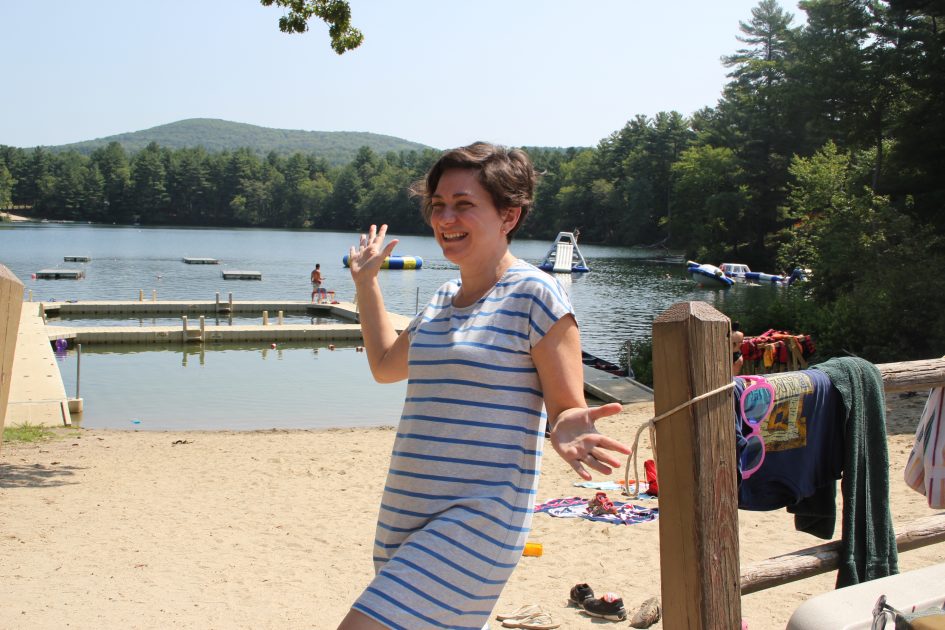
We were delighted to welcome Dr. Edna Friedberg (bio, below) to our machane (camp) for 4 days. Dr. Friedberg is an historian at the United States Holocaust Memorial Museum, and her visit here is through a partnership with the JTS Fellows’ program. As a fellow, she travels throughout the Maryland and Virginia region, spreading Jewish learning in synagogues and other settings. She is available to speak on a wide range of topics.
During Dr. Friedberg’s stay, she delivered several divrei Torah and shiurim (classes) to all ages of chanichim (campers) and tzevet (staff). Most notable is her love for and passion about the Ramah camping movement. She asserts that her own childhood experience at Ramah totally changed her life, and likewise that of sister. They grew up in Champaign, IL where the Jewish community is relatively small. There was one large classical Reform synagogue that was not a good fit for her family, so her parents and others started up a minyan. A previous visitor to our machane, Former U.S. Ambassador to Israel Daniel Shapiro coincidentally grew up in the same community and same minyan! The minyan was traditional and egalitarian. When Edna departed for Ramah Wisconsin for her first 8 week summer in 1984 she knew not one soul. The paradox was that while she was definitely homesick, she also felt very much at home! The entire Ramah universe — language, Zionism, music, food, Shabbat and songs — were familiar and beloved to her. She had heard many of the songs at home on her parents’ records. It was cool, fun, social and lively — the same strong vibe she felt here at our machane. She spent 1984-88 as a chanicha and then served on Tzevet (staff). Edna’s nostalgia for Ramah Wisconsin, where the road sign read “3080 Broadway” (address of JTS), and her exuberance about Ramah Palmer are palpable (photo, above).
Edna and her family live in Washington DC and attend the traditional minyan at Adas Israel. She also serves on the Board of the Milton Gottesman Jewish Day School (JPDS). She is pictured, below, on her first day “around the machane”, with her son and with the Milton Gottesman – Ramah Palmer contingent.
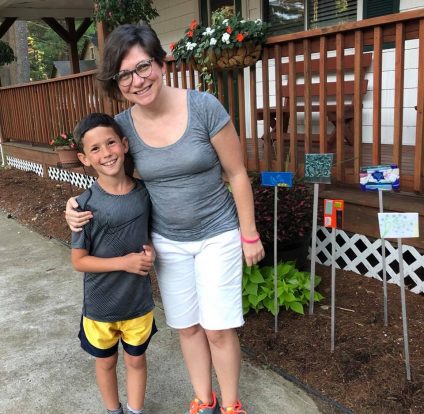
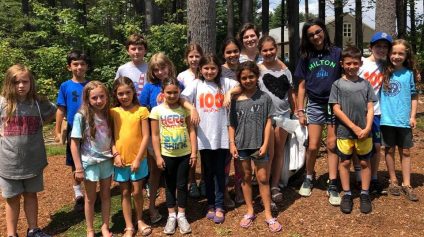
Her two sons are current chanichim in Magshimim and Ilanot. While here, Edna gave a D’var Torah to adat ha-Solelim. She talked about how sometimes we might feel bored and wiggly during davenning; she posed the question of how best to deal with this. She suggested that we can prepare to come with a good state of mind to participate. Just as we pick a good time to talk about difficult subjects with parents, for example, so to we need to enter our conversation with God in a good state of mind. We can not only participate in the parts we enjoy more, such as the singing, the quiet, or the body movements — but also engage with the harder parts and make it all our own. Edna is pictured below, left with her son Noam; and below right, with Elie Greenberg, our Visiting Shira Specialist.
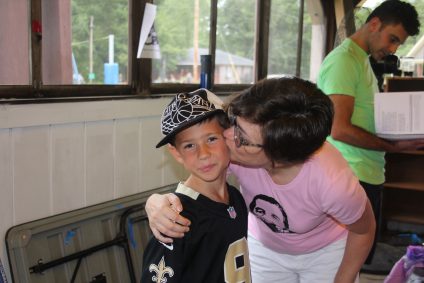
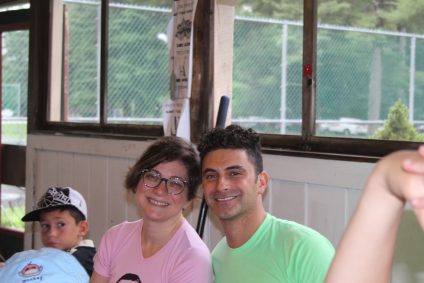
On Friday night, her Shiur (lesson) for Tzevet (staff) was entitled, “the Kosher Meat Riots of New York, 1902”. The shiur was related to our parsha, Re’eh, which includes many of the rules of kashrut. However, the angle was slightly unusual, as Edna told of a relatively obscure episode concerning a boycott spearheaded by some gutsy Jewish women in 1902 New York. They used grass roots community organizing, demonstrations, public disruptions of Torah readings, and public shaming of those who violated the boycott to protest a 50% increase in the price of kosher meat. Their tactics were door to door persuasion of thousands of residents, “picket lines” at dozens of kosher butchers, and verbal harassment of those who violated the “picket lines”. They ultimately succeeded in mobilizing tens of thousands of people, mostly in the Lower East Side tenements in NY but also in some areas of Brooklyn and the Bronx. The intense, focused, “in your face” pressure they mobilized forced the hand of the kosher meat wholesaler, and they lowered the price from 18 cents/lb to 14 cents/lb (the price had been 12 cents/lb prior to the drastic increase).
On Shabbat morning, Dr. Friedberg’s d’var Torah at Machon also dealt with parsha Re’eh and the subject of kashrut. She posed the question: how can we make sense of kashrut? She emphasized the “big message” of kashrut, which is to be mindful in all areas of life, including the food we consume. It is important as we go through life to deliberately reflect on our choices, and not proceed mindlessly, impulsively or by rote. Other examples of this in the Torah are the prohibition on tattoes and the rules concerning the release of slaves in the shmitta year. It is through living mindfully that we achieve dignity — for ourselves and others.
Dr. Friedberg notes that throughout her stay here, she felt the joyous spirit of Jewish life. The Pew Study in 2013 found that for 73% of American Jews, remembering the Holocaust is what makes them feel Jewish. In contrast, the Ramah culture embodies the the joyous, positive aspects of Jewish life: Israel, Hebrew, and reading Torah are but a few examples. She appreciates the forward-looking, positive embrace of Judaism that Ramah promotes.

Edna Friedberg(PhD, GS ’07) is a JTS fellow and a historian at the United States Holocaust Memorial Museum. A graduate of the University of Illinois, she received her PhD in Modern Jewish Studies from The Jewish Theological Seminary, where she wrote her dissertation on the origins of American Jewish services for the elderly. Dr. Friedberg joined the staff of the Holocaust Museum in 1999 and has served as the historian for the museum’s highly visited online Holocaust Encyclopedia and as director of its Wexner Learning Center. She also curated a special exhibit on the legacy of the Nuremberg trials and postwar justice. Dr. Friedberg regularly speaks to audiences across the country and her essays connecting Holocaust history with social, cultural, and political issues today have appeared in the Atlantic, Slate, Newsday, and the Forward. An alumna of Camp Ramah in Wisconsin, she serves on the Board of Trustees of the Milton Gottesman Jewish Day School of the Nation’s Capital and is a member of Adas Israel Congregation.